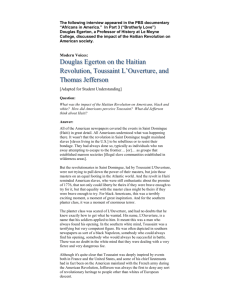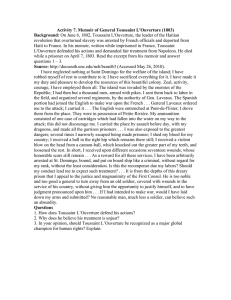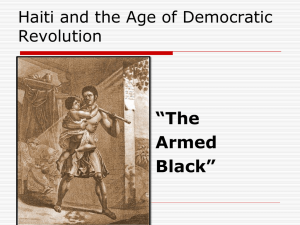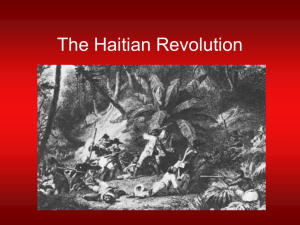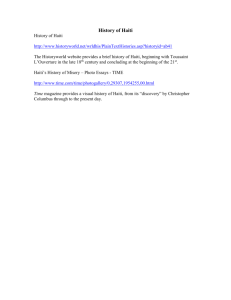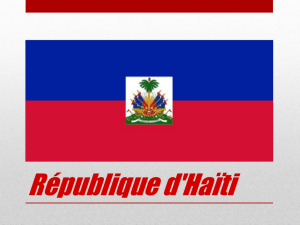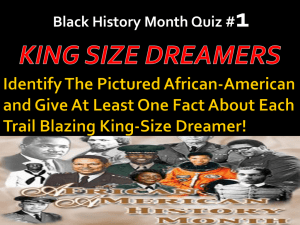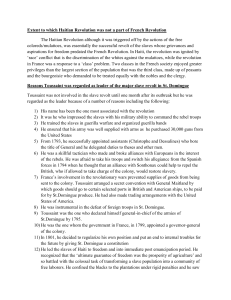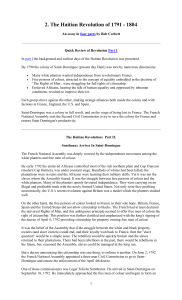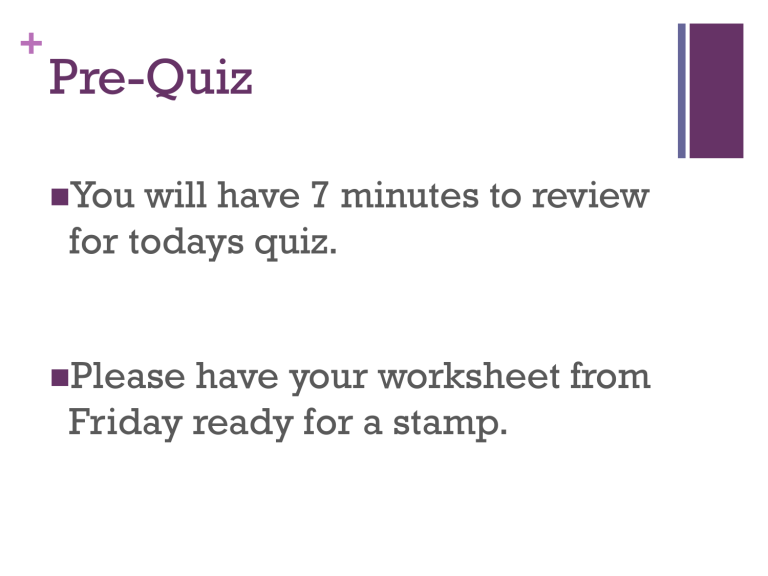
+ Pre-Quiz You will have 7 minutes to review for todays quiz. Please have your worksheet from Friday ready for a stamp. + Quiz! Please clear your desks No talking during quiz and after until all quizzes are collected. 15 minutes for quiz + WARM UP. As a table group find all the following and answer the Q’s. Be ready to share in 5 minutes. I Spy… a cherub rum and tobacco African people bananas Flamingos What do they represent? Pineapples sugar cane What do they say about these islands? What do they tell us about British attitudes toward the West Indies? a boat a royal Navy ship a sea turtle a European man sugar or rum barrels coconuts + Haitian Revolution + Haiti Hayti, Taino word for the island Western half of Santo Domingo, aka Hispaniola French colony of SaintDomingue, 1697-1804 2nd independent nation-state in Western Hemisphere Site of largest successful slave revolt in history + Atlas Cover, 1794 + French St. Domingue French Colony Richest Colony Sugar, rum, coffee, Sugar cane Slave labor + People of St. Domingue African Free Slaves people of color Some biracial Some black Whites Petit blancs Plantation owners (grands blancs) Many absentee owners + Rebellion! Slaves were overworked and underfed Tired of suffering and inspired by talk of liberty and equality, slaves rose up in revolt in 1791. + Boukman Rebellion, a massive slave revolt, 1791 Secret meetings Toussaint L’Ouverture emerged as a leader Spanish support Boukman's Rebellion became a war Toussaint L’ouverture's army wins initial victory of 1791 • 10,000 whites flee St.Domingue (Haiti) • National Assembly in France proclaims equality for all men However, they maintain slavery in their colonies Racial violence: • petit blancs v. free people of color • + Civil War in Haiti Years of fighting More lives lost than any other revolution in the Americas Spain, Britain, and France all sent armies to fight the rebels in Haiti. Why would Britain and Spain get involved? + Results By 1798, rebels had achieved their goal! Slavery abolished Toussaint’s forces controlled most of the island Toussaint became a French Official + Toussaint rules Santo Domingo as Governor General, 1801-1802 Constitution Abolished of 1801 (All Santo-Domingo) slavery Elected legislature Santo Domingo remains French Toussaint L’Ouverture = Governor General for life + Napoleon Napoleon had seized power in 1799 in France Sends army to Haiti in 1802 to reconquer St. Domingue Attempts Massive to reinstitute slavery French casualties 50,000 of 58,000 die French commander agrees to a ‘truce’, deceives and imprisons Toussaint L’Ouverture + Toussaint Dies in Prison Toussaint L’Ouverture dies in a French Prison in 1803 + Haitian Independence Continued Cause for independence continued after Toussaint’s death Late 1803, yellow fever had destroyed the French army France surrenders Island declares itself independent country in January of 1804. New name: Haiti! Haiti eventually becomes a republic in 1820 + Haitian Revolution in World History Napoleon abandons idea of empire in the Americas after losing Haiti sells Louisiana to the USA News spreads to the US Rebellious slaves Paranoid slaves Haitian government shelters Simon Bolivar, before his successful wars of independence Toussaint L’Ouverture becomes a hero to millions striving for freedom + Article & Worksheet Read and annotate article. Complete Cornell Notes for the reading Answer the questions on the back connected to the reading.
